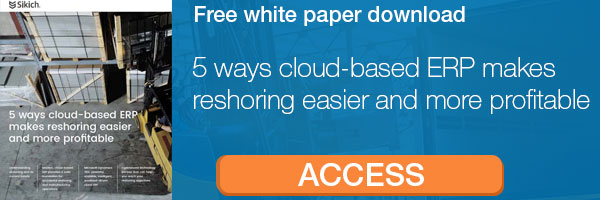Offshoring manufacturers incurred a significant risk to their intellectual property. While it can be hard to predict how likely your systems will be hacked and your sensitive data compromised, part of the reshoring momentum is the idea that it will become easier to safeguard your IP.
In August 2014, the Reshoring Initiative found that only in 8 percent of the known reshoring cases the companies indicated that IP theft motivated them to reshore. The Initiative attributes this low number to a lack of awareness, especially considering that they learned 21 percent of businesses overall experienced data theft or inappropriate access to their IP.
Re-creating and protecting the supply chain
Manufacturing experts have emphasized the prominent, ongoing role of China in IP theft from American businesses, no matter where they are located. They also cautioned manufacturers to avoid reliance on exclusive offshore suppliers and consider reshoring as a strategy to strengthen their control over the supply chain and provide a more effective shelter for their data and IP.
When you reshore, you can take the opportunity to bring greater information protection to your supply chain and enter into new business relationships with regional suppliers that take the security of data and applications as seriously as you do. If you manage your operation on ERP in the cloud, you can easily include them in secure workspaces where you workshop new product designs or develop joint go-to-market initiatives.
Stringent, policy-based security for your business foundation
In safeguarding your cloud-based ERP, you work with different resources than if your technology is on-premise, and the nature of your risks will be different as well. It’s next to impossible to compare the risk liabilities of on-premise vs. cloud ERP or software systems overall because there are so many conditions that influence them. In the cloud as well as on-premise or in the hybrid cloud, which combines both environments, you need to strike the right balance between securing your data and IP assets without making them inaccessible, which would reduce their value.
When your cloud ERP solution is Microsoft Dynamics 365, many of your security requirements can be handled through the tools offered in the Azure Security Center. You can review the security status of your computing resources in Azure at any time you like, make sure the right controls are active, and adjust security levels. When you make changes to the security protocols for your data and applications on Azure, you can draw on recommendations that follow your documented policies and consider the sensitivity and utilization scenarios for the information and applications within your responsibility.
Securing ERP in the cloud
Microsoft research and global, round-the-clock capture and assessments of emerging threats in any form feed directly into your Dynamics 365 ERP environment. You can mitigate many potential risks before your infrastructure has been exposed, and incorporate best-practice recommendations into your security management.
When you reshore manufacturing, and also while you still operate offshore, you can take advantage of these state-of-the-art security features in Microsoft Dynamics 365.
In the Microsoft Dynamics 365 applications, Microsoft created a security model that is targeted for the specific needs of ERP business roles, provides the right level of access to specific sets of records, and limits access to certain important functionalities to authorized users. In addition, you can configure multiple levels of hierarchical security for each business entity to define access authorizations with great specificity for the right individuals and teams.
Cross-organizational cloud security from the ground up
In the area of supply chain security, Microsoft has for many years spearheaded policy and standards initiatives. Today’s security and supply chain management features in Microsoft Dynamics 365 build on the foundation of secure, collaborative supply chain principles Microsoft published as early as 2011. Beyond addressing the immediate security needs of software applications, Microsoft also emphasized the need for transparent, flexible security measures that rely on mutually beneficial relationships and that can address risks at any point in globalized supply chains.
At a physical level, the global network of Azure data centers is well equipped to support your growing manufacturing business without interruption from any cause. Data centers can at an instant’s notice take over for each other if one of them should suddenly go offline. Multiple layers of perimeter and access security protect the servers and storage hardware where your applications and data reside. Data center managers and other workers are submitted to stringent security policies and random checks.
Sikich manufacturing and technology expertise can help you perform a successful reshoring initiative and increase the competitive standing and long-term viability of your business. Get started today.





